Oil prices extended their upward trend during early trading in Asia on Monday, building on last week’s strong performance amid mounting speculation that the U.S. might impose additional sanctions on Russia. Market sentiment also remained cautious as global trade tensions intensified following President Donald Trump’s announcement of new tariffs targeting the European Union and Mexico.
By 21:22 ET (01:22 GMT), September Brent crude futures climbed 0.2% to $70.48 per barrel, while West Texas Intermediate (WTI) futures in the U.S. gained a similar 0.2%, trading at $68.55.
Both benchmarks had surged close to 3% the previous week, with Friday’s gains driven by remarks from the International Energy Agency (IEA), which highlighted tightening short-term supply conditions. Despite OPEC+ increasing output more than expected, the IEA noted that global supplies remain limited as refiners boost production to meet the peak summer travel demand.
Investors Eye Trump’s Upcoming Statement on Russia
Attention is now focused on a “major announcement” regarding Russia that President Trump has scheduled for Monday. Over the weekend, he confirmed plans to send Patriot missile defense systems to Ukraine, underscoring escalating tensions with Moscow.
Reports suggest Trump’s frustration with Russian President Vladimir Putin is growing due to stalled peace negotiations over Ukraine. This has sparked speculation that tougher U.S. sanctions targeting Russian energy exports could be forthcoming.
In the U.S. Congress, bipartisan efforts to pressure Russia through economic means are gaining traction. A proposed bill aims to sharply increase tariffs — potentially up to 500% — on countries like China and India if they continue buying Russian oil and gas. The measure, however, still requires formal approval from the White House.
Trade Tensions Weigh on Oil’s Upward Momentum
Although supply concerns are supporting oil prices, further gains may be limited as trade tensions escalate. Trump announced plans over the weekend to impose a 30% tariff on most goods imported from the EU and Mexico starting August 1. This announcement follows earlier tariff increases on imports from Japan, South Korea, Canada, Brazil, and a steep 50% duty on copper.
The growing trade conflicts have raised worries about global economic growth prospects. Trade barriers often reduce industrial production and international travel — two major drivers of energy demand — increasing the risk that oil consumption could weaken in the coming months.
With less than three weeks remaining to resolve these trade disputes, markets are expected to remain jittery as geopolitical and economic risks collide.
This content is for informational purposes only and does not constitute financial, investment, or other professional advice. It should not be considered a recommendation to buy or sell any securities or financial instruments. All investments involve risk, including the potential loss of principal. Past performance is not indicative of future results. You should conduct your own research and consult with a qualified financial advisor before making any investment decisions.
